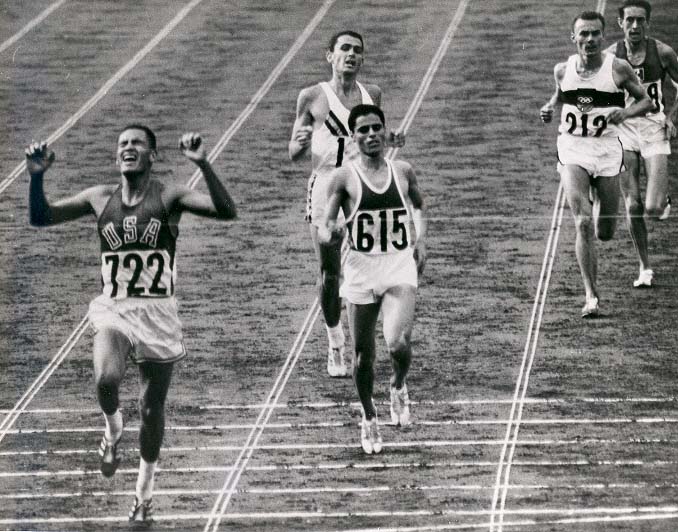
- Details
- By Levi Rickert
One day after the International Olympic Committee announced that it had restored two gold medals solely in Jim Thorpe’s name, Native News Online spoke with another legendary Native American athlete who earned gold on the Olympic stage: distance runner Billy Mills.
Mills, 84, a citizen of the Oglala Sioux Tribe, grew up on the Pine Ridge Indian Reservation. He attended Haskell Indian Nations University and the University of Kansas. Mills attended KU on an athletic scholarship and was a three-time NCAA All-American cross-country runner.
During the 1964 Summer Olympics in Tokyo, Mills won Olympic gold in the 10,000 meter race. His win is considered one of the greatest upsets in Olympic history. He remains the only American to ever win the event.
In a phone call on Saturday, Mills spoke with Native News Online from his home in Sacramento, California. He reflected on the news of Thorpe’s reinstatement as the sole gold medal winner of the pentathlon and decathlon at the 1912 Olympics in Stockholm, Sweden.
This interview has been edited for brevity and clarity.
What was your reaction to the International Olympic Committee’s decision to restore Jim Thorpe’s gold medals solely his name?
It was phenomenal! I just broke into tears because I just felt so elated. When they announced he was the sole recipient I started to cry and in my body, I felt for the first time, I am an Olympian.
Talk about Jim Thorpe being stripped of his gold medals.
I may be wrong, I was always under the impression from the readings I’ve done that when the medals were taken from Jim Thorpe by the International Olympic Committee, the decision was left up to the United States Olympic Committee and the USOC stripped him. I felt it was related to privilege and systemic racism.
When I got back from winning in Tokyo, I never had to deal with the contempt Jim Thorpe went through, (even though he was) one of the most popular Olympians ever.
You have to remember when Jim Thorpe won the gold medals in 1912, Native Americans were not even citizens. As you know, that did not occur until 1924. So when he won it, Americans wanted to own him, but yet there was contempt towards him. There were some who reached out to him, while at the same time rejecting him.
Was Jim Thorpe always a hero to you?
Jim Thorpe was beyond being a hero to me. It goes way, way back to the school in Pine Ridge. We were known as the Thorpes. As a little boy, I read about Jim Thorpe, how great he was. I got intrigued with Greek mythology. I remember reading about Zeus, the god of all gods in Greek mythology. I always thought Jim Thorpe dwelled on Mount Olympus.
To me, it was as if Jim Thorpe dwelled among the gods. You worship gods, and I worshiped Jim Thorpe. So he was beyond a hero to me.
When I begin my spirit journey, one of the first places I’m going to visit is Mount Olympus and I am going to visit Jim Thorpe.
More Stories Like This
Native News Weekly (August 25, 2024): D.C. BriefsScope Narrowed, Report Withheld: Questions Mount Over Michigan Boarding School Study
Zuni Youth Enrichment Project Announces Family Engagement Night and Spring Break Youth Programming
Next on Native Bidaské: Leonard Peltier Reflects on His First Year After Prison
Deb Haaland Rolls Out Affordability Agenda in Albuquerque
Help us defend tribal sovereignty.
At Native News Online, our mission is rooted in telling the stories that strengthen sovereignty and uplift Indigenous voices — not just at year’s end, but every single day.
Because of your generosity last year, we were able to keep our reporters on the ground in tribal communities, at national gatherings and in the halls of Congress — covering the issues that matter most to Indian Country: sovereignty, culture, education, health and economic opportunity.
That support sustained us through a tough year in 2025. Now, as we look to the year ahead, we need your help right now to ensure warrior journalism remains strong — reporting that defends tribal sovereignty, amplifies Native truth, and holds power accountable.
 The stakes couldn't be higher. Your support keeps Native voices heard, Native stories told and Native sovereignty defended.
The stakes couldn't be higher. Your support keeps Native voices heard, Native stories told and Native sovereignty defended.
Stand with Warrior Journalism today.
Levi Rickert (Potawatomi), Editor & Publisher

